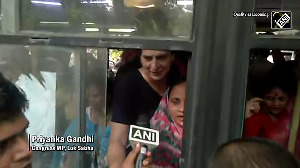The proposed National Investigating Agency will invoke harsher provisions than POTA (Prevention of Terrorism Act) of the National Democratic Alliance government. It was knocked out by the United Progressive Alliance Government, dubbing it draconian.
The proposed law seeks to put onus of proving not guilty on the accused and makes polygraphy, narco-analysis and forensic tests as also confession before officers having magisterial powers as admissible before the courts. The NIA officers will be given the magisterial powers to justify recording of confession before police as valid evidence against the accused.
The urgency with which the government is moving to establish the agency can be judged from the fact that it has already identified Nehchal Sandhu, a long-time special director of the Intelligence Bureau and an IPS officer of Bihar cadre, to head it. The agency will come into being as soon as Parliament put the stamp on the Bill.
As regards the agency's cadre, the government is exploring transfer of a score of experienced hands from the RAW (Research and Analysis Wing), the external intelligence agency, including those from its own RAS cadre. Sandhu was, in fact, tipped to become the RAW chief to succeed Ashok Chaturvedi retiring next month.
The agency will not limit itself to probe the terror cases but also other organised crimes with inter-state and foreign linkages will be using the provisions of the Defence of India Rules, Unlawful Activities Prevention Act, Explosives Act, and a plethora of other laws meant for protecting the national security. The Bill on the anvil will specify the federal crimes over which the agency will have the jurisdiction, requiring the police to hand over any such cases to it.
Accepting the view of BJP's former law minister Arun Jaitley that Parliament can pass a law constituting the agency without stepping on the toes of the state governments since terrorism was more than a simple law and order issues falling in the state domain under the Constitution, the government will be using Article 246 of the Constitution which waives the necessity of securing the states' concurrence.
Unlike the CBI that requires the state government's consent for taking over any case, the proposed NIA can on its own or on the Centre's directive take over the investigation of a terror case and prosecute culprits with the help of its own special prosecutor in the special courts to be set up alike the special CBI courts.
Home Ministry sources say the proposed agency will be much more powerful than even the Federal Agency of the United States. They said a separate Bill will be moved in Parliament to amend the National Security Act of 1080 to constitute a National Security Authority that will supervise NIA investigations and permit prosecution of the culprits it nabs. The authority will have a senior IPS officer as security commissioner in each state for coordination of NIA with the state police.
See also: B Raman: Missing: POTA and FBI-like agency





